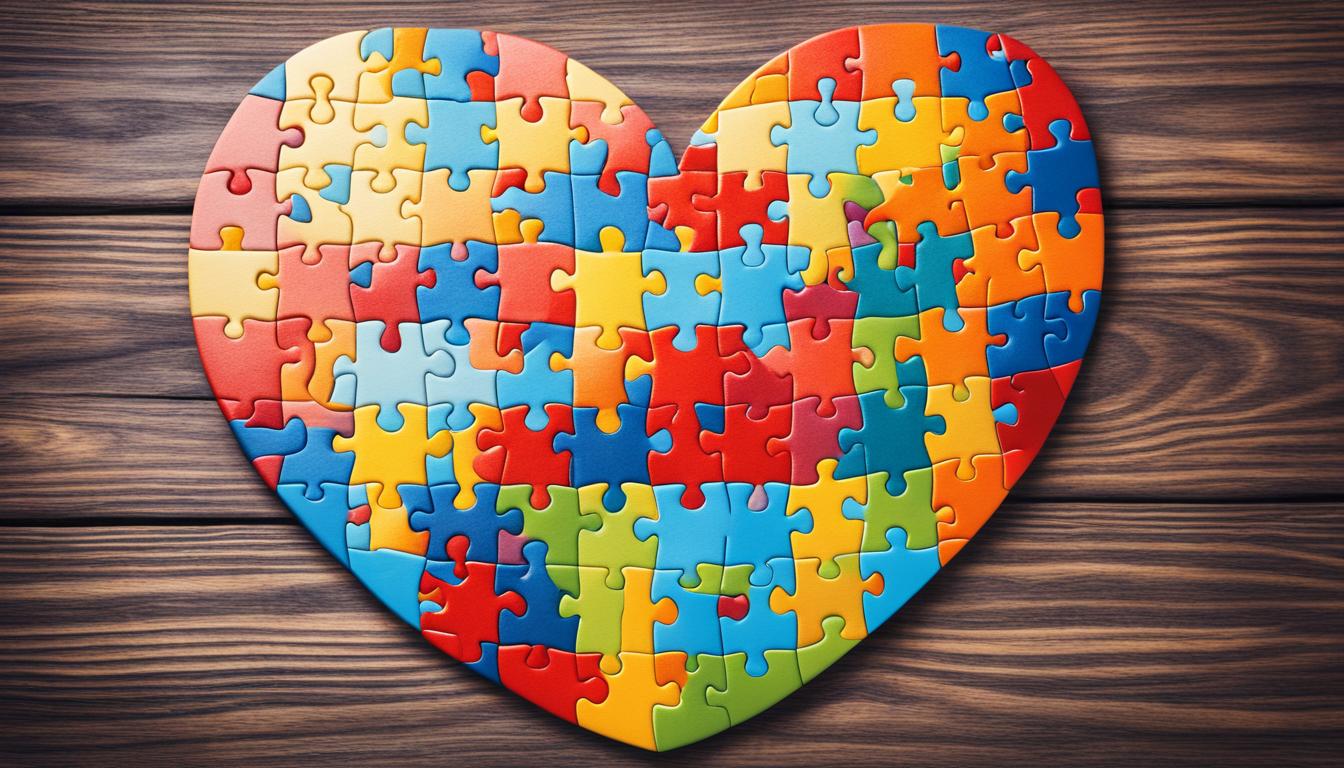“You yourself, as much as anybody in the entire universe, deserve your love and affection.” – Buddha
Our culture often perpetuates the belief that romantic relationships are the ultimate source of happiness and fulfillment. We are taught to believe that love is enough to sustain a relationship and provide all the answers to our deepest longings. But is love really enough?
While love is undoubtedly a powerful force that brings joy and connection, it may not be the sole determining factor in the success of a relationship. The truth is, love alone cannot sustain a fulfilling and harmonious partnership. There are various factors to consider in assessing whether love is enough and whether a relationship has the potential for long-term growth and happiness.
Key Takeaways:
- Love in itself may not be enough to ensure lasting happiness and fulfillment in relationships.
- Building a fulfilling relationship requires self-awareness, understanding of subconscious motivations, compatibility, shared values, communication, and emotional intimacy.
- True fulfillment in relationships comes from becoming whole within ourselves and consciously choosing to commit to each other.
- Compatibility is important in a relationship, including factors like shared values, communication, and emotional intimacy.
- Understanding and addressing our subconscious needs can lead to healthier and more fulfilling relationships.
The Illusion of Love: Cultural Conditioning and Biological Factors
Our culture perpetuates the idea that romantic relationships are necessary for fulfillment and completion. From a young age, we are bombarded with cultural messages about relationships, love, and the ideal partner. Movies, books, and societal norms reinforce the belief that finding love is the ultimate goal in life. This cultural conditioning shapes our beliefs and expectations when it comes to love and relationships.
But is love truly enough? While love is a powerful emotion that can bring joy and connection, there are also biological factors at play. When we fall in love, our brains release a cocktail of hormones such as vasopressin, adrenaline, oxytocin, and dopamine. These chemicals create a euphoric feeling and can be addictive, leading to a desire for more of the same emotional high.

This addictive nature of love can lead to codependency and an unhealthy reliance on our partner for our own happiness. We may become so consumed by the idea of being loved and validated by someone else that we lose sight of our own needs and desires.
Additionally, the biological drive to reproduce plays a significant role in our intense attraction to others. Evolution has wired us to seek out partners who are genetically compatible and able to ensure the survival of our offspring. This biological imperative can override our conscious desires and fuel the intensity of our romantic feelings.
In order to navigate the complexities of love and relationships, it’s essential to recognize the influence of cultural conditioning and biological factors. By understanding the cultural messages we have internalized and the biological forces at play, we can make more conscious choices and create healthier relationships based on compatibility and mutual growth.
The Difference Between Love and Compatibility
Falling in love is a powerful experience that often results from intense attraction and the mirroring of our own denied aspects in others. It’s a magical feeling that sweeps you off your feet and fills your heart with joy. But is love enough for a lasting and fulfilling relationship? The truth is, love does not guarantee compatibility or the ability to meet each other’s needs.
Love is a reflection of our own desires and values, an expression of our innermost selves. It brings excitement and passion, but it doesn’t guarantee that two individuals will be compatible in the long run. Compatibility is a vital aspect of any relationship, as it determines how well you align with your partner on various levels.
Compatibility encompasses shared values, communication, and emotional intimacy. It’s about understanding each other’s needs and desires, and being able to fulfill them. Shared values create a strong foundation and help navigate life’s challenges together. Effective communication fosters understanding, connection, and the ability to resolve conflicts. Emotional intimacy builds trust, vulnerability, and deeper connection.
Take a moment to reflect on your past relationships. Have you ever been in love with someone who wasn’t compatible with you? Perhaps their values clashed with yours, or you struggled to communicate effectively. This misalignment can cause strain and dissatisfaction in a relationship, despite the deep love between you.
Love and compatibility are not mutually exclusive, but they are distinct aspects of a relationship. While falling in love can be exhilarating, it’s important to go beyond the initial spark and assess compatibility. Understanding your own needs and desires, as well as your partner’s, is crucial for building a fulfilling and lasting connection.
In the table below, we explore the differences between love and compatibility:
| Love | Compatibility |
|---|---|
| Based on emotions and intense attraction. | Based on shared values and common goals. |
| Can be impulsive and unpredictable. | Requires conscious effort and compatibility in lifestyle and interests. |
| May overlook differences in values and communication styles. | Thrives on open and effective communication. |
| Can be temporary or fleeting. | Built on a solid foundation for long-term growth and commitment. |
| Focuses on the individual’s desires and needs. | Takes into account the needs and desires of both partners. |
Finding the balance between love and compatibility is key to creating a fulfilling relationship. It’s a journey of self-discovery, understanding, and compromise. Remember that compatibility can be nurtured and developed, just as love can evolve and deepen over time.
Next, we will explore the importance of healing past wounds and creating wholeness in relationships.

Healing Past Wounds and Creating Wholeness in Relationships
Our subconscious mind exerts a profound influence on our choices in relationships. Unresolved past wounds often drive these choices, leading us to seek healing and validation through our interactions with others. Falling in love can be a subconscious attempt to find someone who mirrors the denied aspects of ourselves, offering the potential for healing and growth.
However, true fulfillment in relationships goes beyond finding someone who reflects our wounds. It requires becoming whole within ourselves and consciously choosing to commit to each other. This process involves acknowledging and healing our past wounds, understanding our subconscious motivations, and embracing our conscious desires.
By facing our self-rejection and shadows in relationships, we can begin the journey towards healing and creating wholeness. This involves developing self-awareness and engaging in self-reflection to understand the patterns and behaviors that stem from past wounds. Through this process, we can develop a deeper understanding of our own needs and boundaries, enabling us to engage in healthier and more fulfilling relationships.
Healing through relationships requires open and honest communication, emotional vulnerability, and a willingness to confront and address our own insecurities and fears. It is through these interactions that we can learn to trust and rely on each other, fostering a sense of safety and support.
Creating wholeness in relationships also involves embracing our conscious desires and allowing ourselves to be vulnerable and authentic with our partner. By recognizing and expressing our needs, we can cultivate a partnership built on mutual respect, understanding, and shared values.

Ultimately, by healing past wounds and consciously choosing to commit to each other, we can create relationships that are a source of joy, growth, and fulfillment.
The Complex Nature of Attraction and Need in Relationships
Attraction in relationships goes beyond the conscious desires we have for a partner. It delves into the depths of our subconscious needs, often leading to intense connections that can be difficult to explain. This intense attraction is driven by a complex interplay of various factors, including our shadow aspects and unmet emotional needs.
Our subconscious mind seeks to fill perceived voids created by rejected aspects of ourselves. These shadow aspects represent the parts of our personality that we hide or deny, fearing they might be unacceptable to others or ourselves. Unresolved emotional wounds from the past can also contribute to these shadow aspects.
When we meet someone who mirrors these denied aspects, it can create a magnetic pull that is hard to resist. Our subconscious seeks to heal these wounds and reclaim these rejected parts of ourselves through relationships. This explains why we may feel an intense and undeniable connection with certain individuals.
However, it is important to note that while the intense attraction may be subconscious, it does not necessarily align with our conscious desires. We may consciously desire a partner who possesses certain qualities or meets specific criteria, but our subconscious needs can override these desires and lead us towards individuals who may not fit our conscious expectations.
Understanding and addressing these subconscious needs is crucial for building healthier and more fulfilling relationships. It requires self-awareness and introspection to identify the root causes of our intense attraction and assess whether it aligns with our conscious desires and long-term goals.
By becoming aware of our subconscious needs and shadows, we can make informed choices in our relationships. This allows us to seek partners who not only fulfill our conscious desires but also provide the emotional support and understanding necessary for our deeper subconscious needs.
The Role of Self-Reflection
Self-reflection plays a vital role in understanding our subconscious needs and desires. It involves delving into our past experiences, identifying patterns, and exploring our motivations. By shedding light on the hidden aspects of ourselves, we gain clarity on what truly contributes to our overall fulfillment in relationships.
This self-reflection process may involve journaling, therapy, or seeking guidance from trusted individuals who can provide objective insights. It takes courage to confront our shadow aspects and subconscious needs, but doing so is essential for personal growth and building healthier relationships.
Addressing Subconscious Needs
Once we have identified our subconscious needs, the next step is to address them consciously. This can involve seeking therapy or engaging in self-help practices that promote healing and self-acceptance. By nurturing our own emotional well-being, we become less reliant on others to fill the voids created by our rejected aspects.
It is important to note that addressing our subconscious needs does not mean ignoring or suppressing them. Rather, it involves acknowledging these needs and finding healthier ways to fulfill them. This could include developing a strong support system, pursuing personal hobbies and interests, or engaging in activities that promote personal growth and self-empowerment.
By understanding and addressing our subconscious needs, we can cultivate healthier and more balanced relationships. We can choose partners who align with our conscious desires while also providing the emotional support and understanding necessary for our subconscious needs to be met.

Conclusion
Love is a powerful and beautiful force that plays a significant role in our lives, but it alone may not be enough to guarantee lasting happiness and fulfillment in relationships. Building a truly fulfilling relationship requires a deeper level of self-awareness and understanding of our own subconscious motivations.
By exploring our past wounds and addressing our own insecurities and self-rejections, we can begin the journey of becoming whole within ourselves. This self-healing journey allows us to approach relationships from a place of greater self-acceptance and authenticity.
In addition, building fulfilling relationships involves factors such as compatibility, shared values, effective communication, and emotional intimacy. It requires an ongoing commitment to understanding ourselves and our partners on a deeper level, while embracing both our conscious desires and our shadows.
Ultimately, the path to love and fulfillment in relationships calls for a combination of self-awareness, intentional personal growth, and a willingness to create a space where two individuals can support and challenge each other in a healthy and nourishing way. Through self-reflection and self-empowerment, we can transform our relationships into a source of hope, love, and fulfillment.

